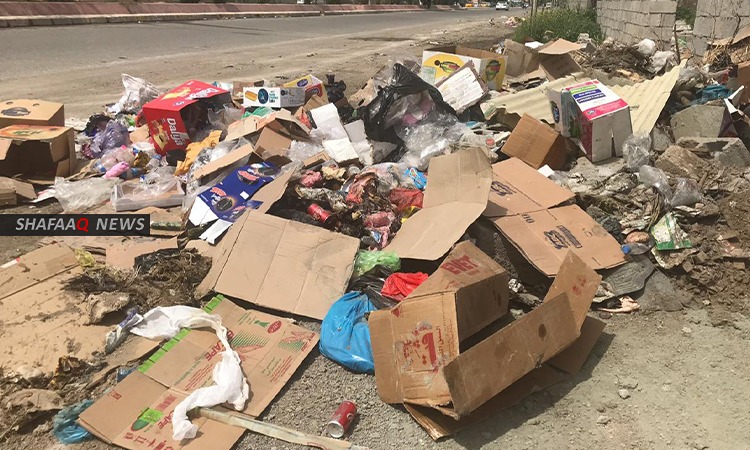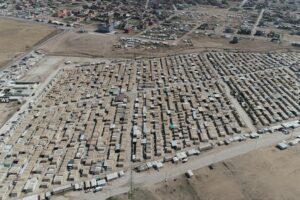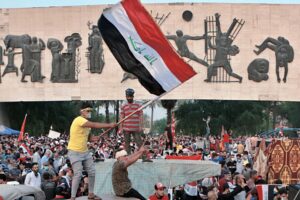
Shafaq News
Every day, Baghdad wakes up under a blanket of its own waste. Streets
and alleys are buried beneath mountains of trash, turning the city into a
living symbol of neglect. But this is more than an eyesore—it is a ticking
environmental and economic time bomb, threatening public health and the
capital’s future.
Uncontrolled burning, unsafe landfills, and stalled waste-to-energy
projects weigh heavily on the city, turning what could be a valuable resource
into a growing crisis. Transforming this burden into energy and opportunity has
become Iraq’s urgent challenge.
Lost Wealth Buried
Environmental expert Ahmed Al-Saleh highlighted that official landfills
are major sources of pollution, releasing gases and smoke that drive up carbon
emissions. While countries around the world turn such sites into hubs for
investment and recycling, Iraq’s efforts are limited to sorting small
quantities of materials such as plastic and aluminum, leaving vast amounts of
reusable waste to be discarded.
“These wastes represent lost wealth that investors, traders, and workers
alike could benefit from,” Al-Saleh explained to Shafaq News. He noted that
landfills abroad generate electricity, recover investable gases, and even
supply hot water for heating. In Iraq, however, the issue remains neglected
despite repeated reports from the Ministry of Environment to municipalities and
health authorities.
Baghdad produces roughly 10,000 tons of waste daily—about 300,000 tons
each month—with spikes during religious events and large-scale visits. Each
resident generates between 1.25 and 1.5 kilograms per day, the highest per
capita rate in the world.
The Baghdad Municipality operates just 12 compactors to compress waste
before transporting it to landfills, which are scattered across the city. The
capital further hosts 221 landfill sites, 149 of which are unregulated, and
only 17% meet environmental standards.
Read more:Could Cleaning the Tigris River Help Repair Iraq’s Damaged Reputation?
Turning Trash to Power
Currently, the capital lacks specialized recycling plants.
Waste-to-energy projects are under negotiation with two companies to build
electricity facilities on the outskirts of the city, though pricing discussions
are ongoing. Operations are expected to begin in roughly two years.
“Baghdad Municipality continues daily operations to collect waste,
compress it at municipal compactors, and transport it using specialized metal
containers,” Adi Al-Jandil, the municipality spokesperson, explained, noting
that the municipality owns two official, environmentally safe landfills outside
the city: one in al-Nabaa, north of Baghdad, and the other in Nahrawan, east of
the capital.
Al-Jandil confirmed that a Chinese company has been contracted to burn
around 3,000 tons of waste daily, converting it into electricity with a
capacity of 100 megawatts. The company has received the land, completed the
infrastructure, and installed the plant. The municipality is also exploring
recycling options.
Data indicates that solid waste can generate between 6 and 12 gigajoules
of energy, equivalent to 1.7–3.3 megawatt-hours, while plastic and rubber waste
can produce 30–40 gigajoules, or 8.3–11.1 megawatt-hours.
Earlier this year, Prime Minister Mohammed Shia Al-Sudani launched a
waste-to-energy project in Nahrawan, with Electricity Minister Ziyad Ali Fadel
later reporting that the contract was signed with Shanghai-based SUS for $498
million, granting the company a 25-year investment right.
Poison Next Door
Omar Abdul Latif, of the Green Iraq Observatory, highlighted to Shafaq
News that waste continues to attract scavengers who collect materials before
burning, a major source of pollution in the city.
Uncontrolled burning poses serious environmental and health risks,
particularly near landfill sites. Once located on the outskirts, many landfills
are now just a few hundred meters from residential neighborhoods due to rapid
urban expansion, increasing exposure to toxic emissions.
Residents increasingly rely on private collection services, paying daily
fees or monthly subscriptions of 10,000–15,000 Iraqi dinars (approximately
$6–$9) per household, adding financial strain. “The cost of private waste
collection is squeezing families already struggling with rising living
expenses,” Abdul Latif noted.
Landfills release toxic gases and large amounts of methane, a greenhouse
gas 25 times more potent than carbon dioxide. Leachate seeps into groundwater,
spreading toxic substances and heavy metals. Thousands of workers manually sort
waste without protective gear, putting them at risk of severe respiratory and
skin illnesses, while nearby residents—particularly children and the
elderly—endure smoke and foul odors daily.
International examples offer guidance for safer and more productive
waste management. In Sweden, imported waste fuels energy plants, while
Turkiye’s Koktece Koy facility converts landfill methane into electricity for
tens of thousands of homes.
Germany captures landfill gas to heat buildings and power local grids,
and Japan relies on controlled incineration with strict emission standards to
reduce landfill dependency.
Read more:Waste in Iraq: a significant untapped resource lacking investment
Solutions Need Spine
Despite the magnitude of the problem, Baghdad’s waste management remains
mired in bureaucracy and a lack of enforceable regulations. The Ministry of
Environment submits repeated reports, yet the absence of coordination among
municipalities, health authorities, and strategic plans for recycling or energy
utilization allows the
crisis to worsen year after year.
Experts maintain that solutions are within reach if political will and
investment are applied. Biogas units can be established, local and foreign
companies encouraged to enter the recycling sector, and source separation
programs introduced in homes and institutions. Modern engineered landfills can
prevent leachate leakage while also enabling gas collection for electricity and
heating.
Read more:Poisonous time bomb: Iraq’s struggle with medical wastes
Ultimately, Baghdad faces two paths: continue bearing an escalating
environmental and health burden from waste, or transform it into an economic
resource that boosts energy supply, generates jobs, and protects the
environment. The challenge does not lie in a lack of resources—they exist—but
in management.
Written and edited by Shafaq News staff.





